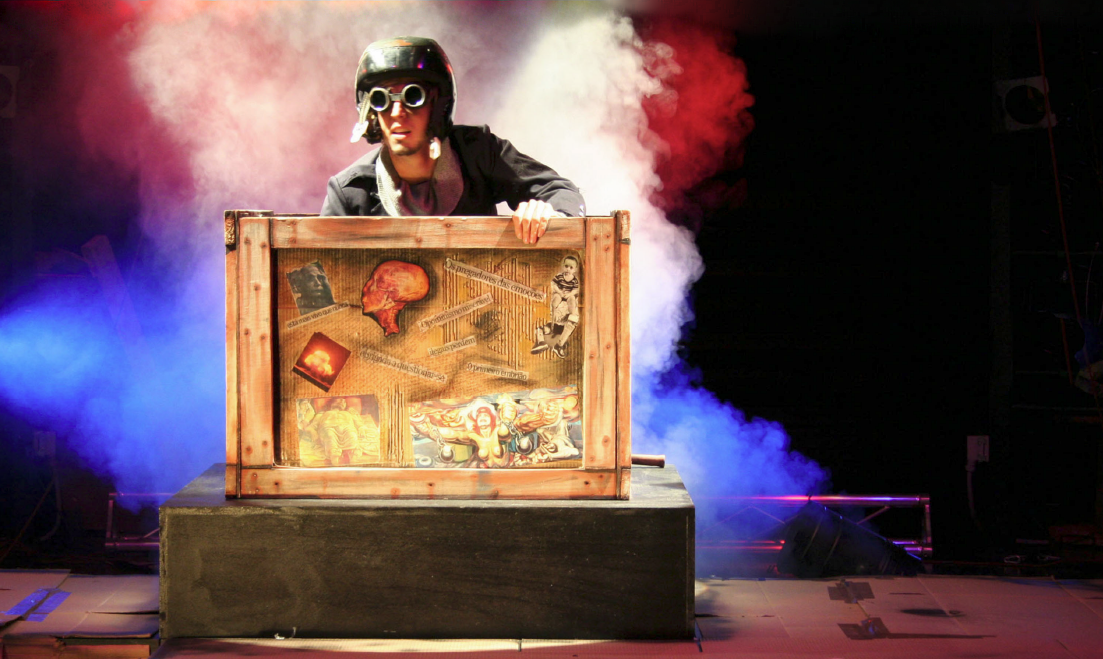
Phantom Feelings and Theatre Co. brought Salvo-Conduto to the Redgrave Theatre last night, and it proved to be something of an oddity. At the start there is darkness and repeated industrial noises – hisses, thumps and rumblings. A prone figure writhes and holds its hands to its ears. A large plywood box sits centre-stage. It is covered in a variety of illustrations; in the gloom I can just make out that one of them is that familiar drawing that depicts the ascent of homo sapiens from ancestral ape to modern man. The figure rises and stands. It is a young woman dressed in grubby working clothes. She walks around and lies down again. There are bright lights, the wooden box shakes and emits dry ice. The box continues to shake noisily for a minute or so. Then a man emerges wearing a motorcycle crash-helmet. He and the woman speak to each other in an animated, urgent fashion. I have absolutely no idea what they are saying, for they are talking in Portuguese. I hear some laughter from fellow members of the audience and I begin to suspect that I am the only person among the mere twenty or so in the auditorium who is not fluent in that language. I check through the publicity material, but there is no mention that this play is not in English. Now aware that I cannot possibly give Salvo-Conduto a fair review I creep out.
In the foyer I grumble to the lady who had been selling tickets that the play is in a foreign tongue. ‘Yes’, she replies, ‘but with English surtitles.’ Oh dear. Shamefaced I creep back to my seat. I still can’t see any surtitles. I move to a seat further back and the surtitles are revealed – in very small print and quite invisible from my original location.
From this point on I should be able to report that all becomes clear, but clarity is in short supply. The play is so wordy and the surtitles are so small, that any attempt to read the rapidly appearing and disappearing words means that I am so busy squinting above the proscenium arch that I am missing all the action. Furthermore, the words themselves frequently make little or no sense. The language is sometimes grandiose, sometimes gobbledygook, and usually a combination of both. ‘Encompass my chest of shock and anxiety!’ and ‘I am the waste of your stubbornness!’ are typical. It is not clear whether this is a very poor translation of coherent dialogue, or a very good translation of twaddle. I will charitably assume that the former explanation is the correct one.
I decide to focus on the two characters on stage and try to make do with just the occasional glance upwards for enlightenment. It seems that the man is a crackpot inventor who is convinced that he has invented time travel. The box is his time machine. She is all too aware that he is deluded, but she indulges his fantasies out of a deep affection for him. His periods of blackout when he believes he is hurtling through time and space are achieved by her giving him a sharp rap on his crash-helmet with a large hammer. When he regains consciousness she adopts a variety of disguises to convince him that he is meeting creatures from the distant future. Their relationship is distinctly reminiscent of Don Quixote and Sancho Panza.
João Ricardo Aguiar and Maria de Jesus Rocha play these roles with considerable energy and charm, though I found the sudden swings from slapstick to apparent profundity unconvincing. At the end of the play they explained that they hope to tour Salvo-Conduto in English next time. If that is their plan, they must not stick with their current translation. Some of the lines are unforgettable, but for all the wrong reasons. ‘The scream since in my chest I do not lay to death.’ Quite so. ★★☆☆☆ Mike Whitton 7th May 2016

